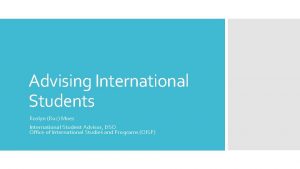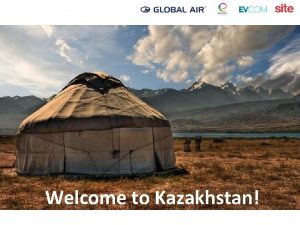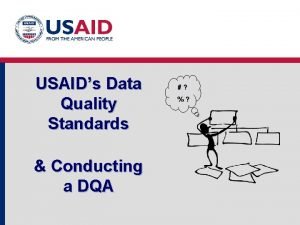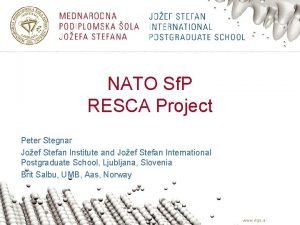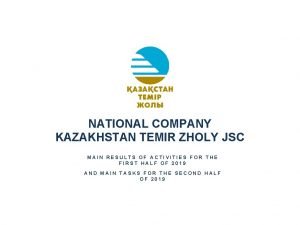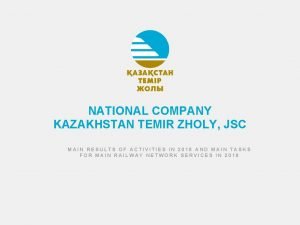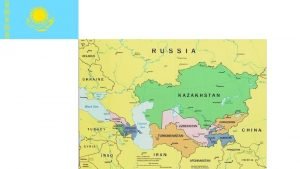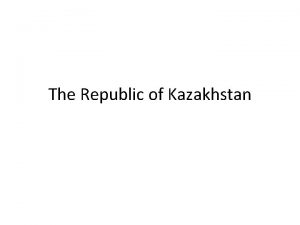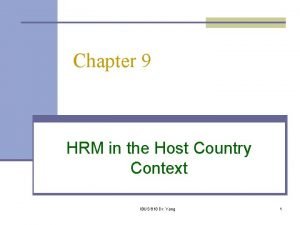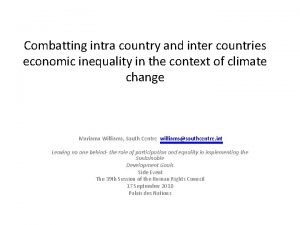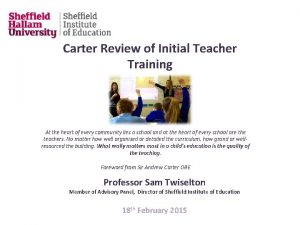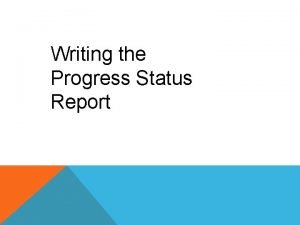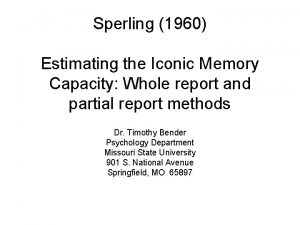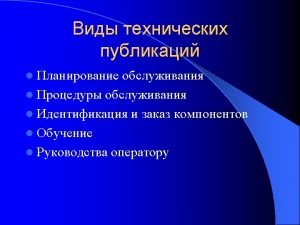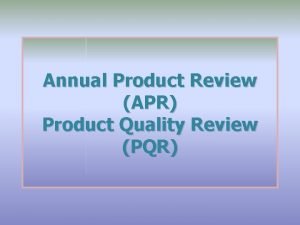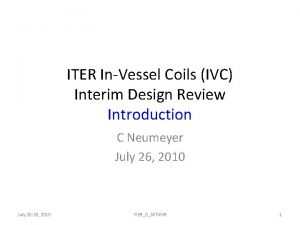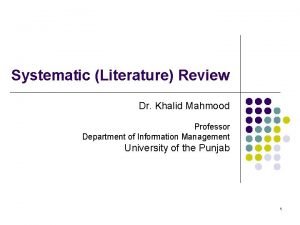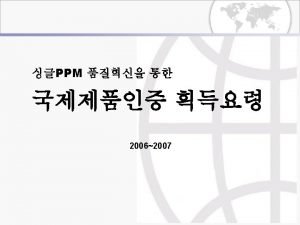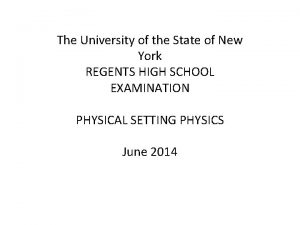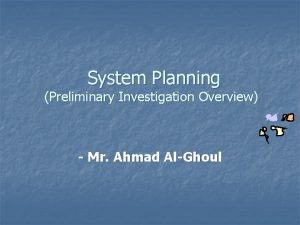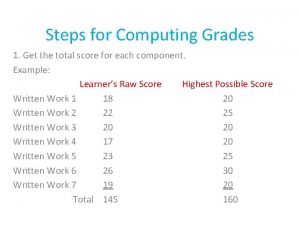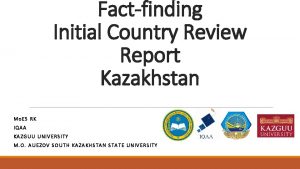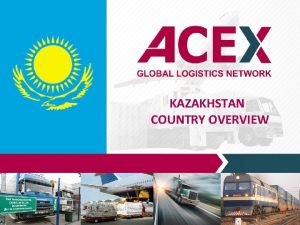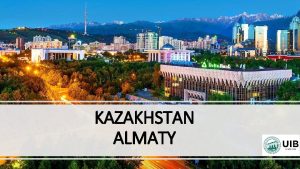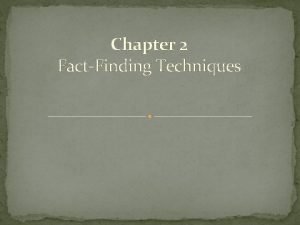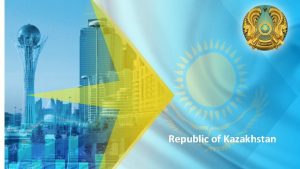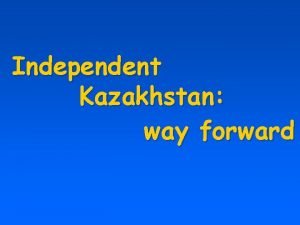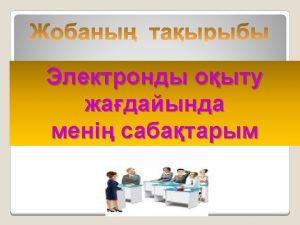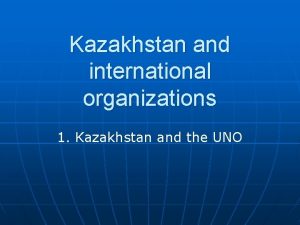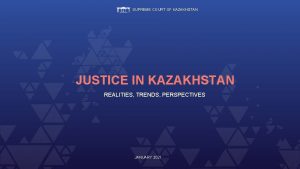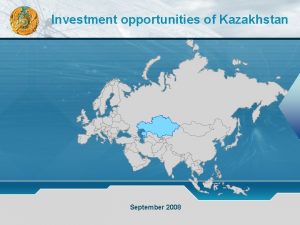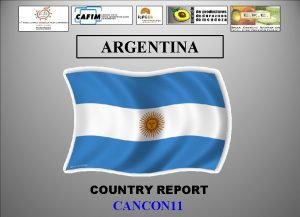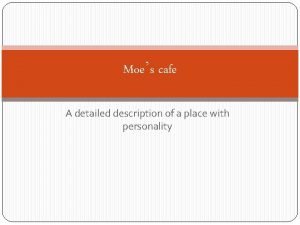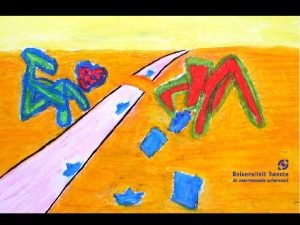Factfinding Initial Country Review Report Kazakhstan MOES RK







































- Slides: 39

Fact-finding Initial Country Review Report Kazakhstan MOES RK IQAA KAZGUU UNIVERSITY M. O. AUEZOV SOUTH KAZAKHSTAN STATE UNIVERSITY

Content Methodology Admission Study Defense QA HEIs Main findings Challenges Expectations

Methodology QUALITATIVE APPROACH DOCUMENTARY ANALYSIS Analysis of State regulations and internal documents of HEIs, regulating delivery of Cycle 3 programs Kaz. GUU University CASE STUDY M. O. Auezov South Kazakhstan State University Questionnaire of Cycle 3 programs students and employers Interview with the staff of HEIs (heads of academic units and teaching staff)

Changes in the number of HEIs in Kazakhstan* 153 101 55 166 182 175 176 140 145 149 126 128 131 63 1991 1993 1995 1997 1999 2001 2003 2005 2007 2009 2011 2014 2016 2017 * Source : Mo. ES RK


Students` enrollment in Kazakhstani HEIs Level of degree Number of students Number of HEIs 477, 07 thousand people 131 Master`s degree 32, 8 thousand people 105 Doctoral degree 2, 710 thousand people 63 Bachelor`s degree 48% HEIs deliver Cycle 3 programs

Statistics on groups study programs in Classificator of Majors in Higher and Postgraduate Education Levels # The title of the specialties 1 2 3 4 5 6 7 8 9 10 11 12 13 Education Humanities Law Art Social sciences and business Science Technical sciences and technology Agricultural sciences Services Military and security Healthcare and social benefits (Medicine) Veterinary science Healthcare and social benefits (Medicine) Total Bachelor`s degree (4 years = 135 credits) Specialist (5 years = 167 credits) Master`s degree (1 year = 24 credits/ 2 years = 55 credits) Cycle 3 degree (3 years = 75 credits) 23 12 4 22 16 12 39 12 11 2 4 157 2 2 4 24 14 4 22 19 13 50 12 12 2 5 2 179 24 14 4 23 19 13 51 12 12 2 3 2 179 The Classificator of Majors in Higher and Postgraduate Education contains 13 groups of majors - 519 study programs 7

Admission • The admission of students is carried out on the basis of the competition • Applications are submitted once a year from 10 to 30 of July EXAMS 1. The foreign language test (English, French, German and Arab for programmes for which fluency in Arab is required) Applicants are examined via tests, developed by admitting HEIs. The tests are conducted at HEIs, assigned by the Mo. ES RK Applicants can undergo such international exams as IELTS (not less than 6 scores), TOEFL (not less than 560 scores), Deutsche Sprachprufung fur den Hochschulzugang (Niveau С 1/level C 1), Test de Franзais International (not less than 400 scores). All these minimum amount of scores help to “PASS” a foreign language tests level of examinatiom. 2. The professional subjects exams/test (during the exams representatives of the Mo. ES RK are presented as observers).

Admission Eligibility criteria: §Pass foreign language and professional subject exams. § Obtain a Master`s degree in taught route or Master`s degree in professional route. In latter the applicants have to undergo courses on Pedagogy to be eligible to apply. § 3 years of experience (will be required from 2018 in line with the State Education Development programme for 2016 -2019, in addition from 2019 Doctoral students will have a right to choose the HEI).

The average expenditure on training of 1 Doctoral student, 2011 -2016 (in euro) 30000 25000 20000 15000 1 euro=365 tenge *only civil HEIs are considered 10000 5000 0 2011 -2012 -2013 -2014 -2015 -2016 -2017 Nazarbayev Unievsrsity 0 0 20295 21156 17690 26501 Other HEIs 3, 884 3, 915 3, 895 Min 3 580 euro Max 4 153 euro


Cycle 3 programs: RESEARCHPEDAGOGICAL ROUTE PROFESSIONAL ROUTE Study duration: 3 years = 75 credits Positive decision of the Committee for Control of Education and Science under the Mo. ES RK Philosophy Doctor (Ph. D) degree Specializes Doctor degree The Cycle 3 programs are delivered in line with: Ø the list of majors and qualifications that the HEIs eligible to deliver; Ø state compulsory standard of postgraduate education; Ø standard curriculum of specialties; Ø standard and working training programs in the disciplines; Ø academic calendar; Ø individual working plan of the doctoral candidates.

Supervision on doctoral theses RESEARCHPEDAGOGICAL ROUTE PROFESSIONAL ROUTE 2 consultants (national and foreign), appointed by the decision of the Academic Council among the number of Candidate/Doctor of Science or Ph. D/Specializes Doctor and specialists in the field of scientific research of a doctoral student Exception The thesis containing state secrets is carried out under the supervision of 2 national consultants who have degree of Candidate/Doctor of Science or Ph. D/Specializes Doctor and who are specialists in the field of scientific research of a doctoral student, or have the military (special) rank not lower than colonel with experience of scientific and pedagogical work (not less than 5 years) 13

Criteria for supervisor The main criteria for choosing a research supervisor are the following: Ø a scientific degree of Candidate/Doctor of Science or Ph. D/Specializes Doctor; Ø active work in this field of knowledge and experience in the scientific supervision of doctoral thesis; Ø at least 10 publications on the doctorate direction in the rating international journals with a high impact factor.

Nature of the Cycle 3 programs Cycle 3 Programs are developed taking into account the National and European qualifications frameworks and are formed on a modular structure. The structure of the Cycle 3 Programs contains 2 components 20% The educational component (20%) of the doctoral program includes disciplines of 2 cycles: 1) basic disciplines (BD – 4% = 3 credits) and 2) major disciplines (MD – 16% = 12 credits). Each cycle includes: 1) the disciplines of the compulsory component and 2) the elective component educational 80% scientific The scientific component (80%) of the doctoral program is formed from the research (experimental) work of the doctoral candidate, scientific publications and the writing of a doctoral dissertation

The content of a Cycle 3 Program № Name of disciplines and types of activity KZ credits ECTS credits 1 Cycle of basic disciplines 3 5 1) Compulsory component 3 5 2) Elective component ATT 2 Cycle of major disciplines by profile 12 1) Compulsory component 2) Elective component 12 18 Total theoretical training 15 23 18 - 3 Additional types of training not less than 55 82 1) Practice (educational, research or industry-based) not less than 5 7 2) Scientific-research (experimental-research) work not less than 20 30 3) Doctoral dissertation 30 45 4 Final attestation 5 7 1) Complex examination 1 2 2) Completion and defense of a doctoral dissertation 4 6 Not less than 75 112 Total

Criteria for a dissertation (thesis) The thesis must meet one of the following requirements: 1) to contain new scientifically grounded results, which solve an important scientific problem; 2) to contain new scientifically grounded results, the usage of which provides for solving an important applied problem; 3) to contain new scientifically grounded theoretical and (or) experimental results, a set of which is important for the development of specific scientific directions. The main scientific results of thesis are published before the defense at least 7 publications: 3 publications in editions recommended by the Committee for Control in Education and Science of the Mo. ES RK, 1 publication in an international edition with non-zero impact factor in Thomson Reuters Database or included in the Scopus Database, and 3 publications in proceedings of international conferences, including 1 publication in proceedings of a foreign conference. Challenges: One of the deterrents to the greater publication activity is the insufficient English language proficiency.

Defense of a doctoral dissertation includes the preparation of a dissertation, its design and procedure for defense. Defense is conducted in accordance with the approved schedule at an open meeting of the Dissertation Council with the participation of at least 2/3 of its members, with mandatory participation in the meeting of at least 3 specialists in the specialty corresponding to the profile of thesis to be defended. The meeting of the Dissertation Council is held under the guidance of the Chairman of the Dissertation Council. In the Chairman absence or simultaneous absence of the Chairman and the Academic Secretary, the meeting of the Dissertation Council is not held. Decision of the Dissertation Council is considered to be accepted as positively, if 2/3 or more members of the Dissertation Council voted positively for it. If less than 2/3 of the members of the Dissertation Council voted for a positive decision, a negative decision is made. An appeal to a negative decision of the Dissertation Council is submitted by a doctoral candidate in informal addressed to the rector of the university within two months from the date of the Dissertation Council’s decision. Challenges: The decrease of the number of doctoral students graduation with defense: within the last 5 year period only 27. 1% of the 2, 285 graduates defended their thesis, the lowest figures are presented for 2016 - only 18. 9%. The reason is mainly connected with ineffective distribution of time for doctoral students’ work on thesis, and with the insufficient involvement of foreign research supervisors.

The procedure for doctoral thesis defense is performed in the following sequence: - The introductory speech of the chairman on the quorum, the competence of holding the meeting, the presentation of the doctoral candidate, the specialty on which he studied and the specialty on which thesis is defended and thesis theme. - Presentation of the academic secretary to announce the compliance of the doctoral candidate's documents with regulatory requirements, indicating the completeness and conformity of scientific publications; - Report of the doctoral candidate (up to 20 minutes); - Questions to the doctoral candidate, doctoral answers; - Speech of scientific consultants; - Speech of reviewers; - Doctoral candidate reply to reviewer's comments and conclusion on their recommendations; - Discussion of the Dissertation Council members; - Concluding words of the doctoral candidate; - Electing a counting commission in number of 3 Dissertation Council members, excluding the chairman; - Conducting a ballot voting of the petition to confer a degree; - Report of the counting commission chairman about results of a ballot voting; approval of counting commission minutes; - Declaration of the public defense results; - Conclusion of the Dissertation Council on the doctoral thesis defense.

The composition of the Dissertation Councils are created by the Committee for Control in Education and Science of the Mo. ES RK for 3 calendar years in higher education institutions, which provide doctoral programs on the basis of the state budget (state educational grants). The Dissertation Council includes at least 3 specialists for each specialty with a scientific degree (Candidate/Doctor of Sciences, Ph. D/Specializes Doctor), who has at least 5 scientific publications in the relevant field of research. Herewith at least 1/3 of the members of the Dissertation Council should be full-time employees, at least 1/3 of the members should be representatives of other HEIs, and at least 1/3 of the members should be representatives of scientific or other organizations. The Dissertation Council consists of a Chairman, a Deputy Chairman, an Academic Secretary and members. The quantitative composition of the Dissertation Council is at least 5 persons. The rector of the university, employees and members of the expert councils of the Committee for Control in Education and Science of the Mo. ES RK and supervisor are not included in the composition of the Dissertation Council.

QA External quality assurance of Cycle 3 programs is conducted by national (2 – IQAA, IAAR) and foreign (2 – ASIIN, FIBBA) accreditation bodies, which are listed in the Register of Recognized Accreditation Bodies (Register 1) compiled by the Mo. ES RK. A higher education institution is free to choose an accreditation agency and files an application independently. The cost of the accreditation procedure is taken by the university itself. The accreditation procedure of Cycle 3 programs is conducted according to the standards and criteria of specialized (program) accreditation of higher and postgraduate education study programs. As a rule, there are no separate accreditation standards for doctorate level. The methodology of accreditation is consistent and follows a model generally applied in the European Higher Education Area and international practice in the field of quality assurance: Self-assessment of a study program and writing a report An external review (site visit) for fact-finding An external review report Decision-making by the independent Accreditation Council Post-accreditation monitoring of accredited study programs The process of program accreditation (the full cycle of all procedures) can take 1 -1, 5 years. The composition of an expert panel includes national experts from academic field, international experts, student and employer experts. Academic experts for assessment of Ph. D programs have degrees not less than a Doctor of Sciences, Ph. D or Professional Ph. D, extensive teaching experience in higher education institutions and design of Ph. D programs. External review reports with the composition of an expert panel, as well as decisions on accreditation are published in an open access on the QA agency’s website. In case of a positive decision the program can be accredited for full term (5 years or 7 years (IAAR - in case of a successful re-accreditation of a study program) or conditional term (1 year, 3 years). In case of a negative decision a study program is considered as not accredited. The periodicity of accreditation is defined by the validity term of the previous accreditation.

At national policy level Main challenges and solutions 1 A need to considerably increase quantity of state grants for Ph. D students 2 Development of separate standards for the accreditation of Ph. D programs 3 Development of a mechanism to stimulate graduates of doctoral studies for employment in research organizations and enterprises (social packages, bonuses) 4 Implementation of doctoral research findings in industry

M. Auezov South Kazakhstan State University Methodology of data collection A survey of university staff responsible for definite activities (quality assurance, monitoring, evaluation) Studying of external and internal normative documents (State obligatory standard of postgraduate education, Model rules, QMS Procedures, Regulations, Methodical instructions etc. ) Interview with the staff (31 people), Ph. D students (16 people, 7 degree programs) and employers (12 enterprises)

M. Auezov South Kazakhstan State University offers 14 Cycle 3 Programs (Ph. D) (scientific-pedagogical and profile direction) 6 D 070100 - Biotechnology (by industry) 6 D 072000 - Chemical Technology of Inorganic Substances 6 D 072100 - Chemical Technology of Organic Substances 6 D 072600 - Technology and Design of Light Industry Products 6 D 073300 - Technology and Design of Textile Materials 6 D 072400 - Technological Machines and Equipment (by industry) 6 D 073100 - Life Safety and Environmental Protection 6 D 073000 - Manufacture of Building Materials, Products and Structures 6 D 010900 – Mathematics 6 D 012000 - Vocational Training (by industry) 6 D 011100 - Computer Science 6 D 020500 - Philology 6 D 050600 - Economy 6 D 060100 - Mathematics

Training of doctoral students in M. Auezov South Kazakhstan State University has been conducted since 2009. At present, 25 Ph. D students have successfully completed their Ph. D programs, 21 of them have defended their Ph. D theses. Nowadays total number of Ph. D students – 39, where 32 – state grants 7 – paid basis

For HEI Main challenges - there are no difficulties connected with enrollment of students; doctoral students, as a rule, have a corresponding basic education - difficulties in the preparation of doctoral candidates: a small workload allocated for the teaching staff for the scientific management of doctoral students, which does not allow them to give sufficient time, insufficient time period for the scientific internship, insufficient level of professional English of doctoral students, high cost of publications in journals included in the database Scopus, Thomson Reuters, restrictions on the introduction of the results of dissertations in production - the employment of graduates and their work is monitored by both the responsible department and the Center for Postgraduate Education of the University. The majority of doctoral students, after defending dissertations and approval in the Committee for Supervision in the Ministry of Education and Science of the Republic of Kazakhstan, stay working at the university as a research assistant or teacher - at the end of each semester the doctoral students pass the certification, i. е. provide an extended report on the implementation of theoretical training program and on the intermediate results of their research in the form of presentations and answers to questions. Attestation is carried out in 2 stages - first at the meeting of the department, and then at the Scientific and Technical Council

Main challenges For Ph. D students Admission to the doctoral program in most cases is aimed at acquiring new skills and competencies, and also with a degree that opens up wider career opportunities both in the professional sphere, in the university and in the public service. The majority of respondents noted the transparency of doctoral programs and understanding of their structure. All doctoral students noted the high level of support provided by the university and faculty in acquiring a Ph. D program. After the completion of the programs, the graduates' expectations are related to professional career growth and a higher level of wages. Ph. D students’ wishes are associated with a decrease in the number of control points, equipping the laboratory base, increasing the duration of foreign internships.

For the socio-economic world (employers interview) Main challenges There is an imbalance in the employment of graduates of doctoral studies: most Ph. D doctors work at universities, and are engaged in a greater degree of educational activity. The proportion of Ph. D doctors working in industry is insignificant, although some businesses note the need for Ph. D doctors as researchers of technological development of production. Enterprises note that doctoral programs meet their requirements, since most large enterprises participate in the development of programs and the formulation of competences. In addition, in a number of cases doctoral students conduct experiments at enterprises during research practice, which makes it possible to assess the level of knowledge obtained. Usually enterprises participate in the implementation of educational programs, only by providing bases for practice and experimentation. Representatives of enterprises do not have the opportunity to teach, since there is a restriction that involves only teachers with a degree in teaching. The enterprises note the following positive aspects of the programs: themes of doctoral dissertations are always relevant and always these works end with experienced tests proposed new technology or technological regimes. In a number of cases, theses have rationalization solutions that are used by enterprises.

Good practice International part of Cycle 3 programs: foreign consultant and compulsory foreign internship. The state provides funding for the invitation of a scientific consultant to work with a doctoral student at the place of study, and also covers the costs of a foreign doctoral internship. Thus, doctoral students have the opportunity to undergo training in leading universities and scientific centers in the US, Japan, Germany, France, China, Malaysia and other countries. Special attention is paid to organizing the practice of doctoral students. In the educational programs of doctoral studies, the following types of practices are provided: pedagogical, scientific research, and also foreign internship. Results of all types of practices, results of internships are also discussed at the meeting of the department, the report is protected before commission. One of the most important elements in the training of doctoral students is the academic mobility of doctoral students, which is funded by the state. During one academic period, doctoral students have the opportunity to conduct research in partner universities. For example, in 2017 -2018, M. Auezov South Kazakhstan State University plans academic mobility of doctoral students on the specialty "Mathematics" and “Computer science" with the University of Putra (Malaysia), in 2018 -2019, the specialty "Technology of Processing Industries" with the University of Padova (Italy). In most technical universities of Kazakhstan, doctoral students are executors of scientific projects funded by the Ministry of Education and Science of the Republic of Kazakhstan (grant projects). Thus, practical implementation of research results is provided.

Expectations for the training Getting experience of European partners in Cycle 3 Quality Assurance System Acquiring the following knowledge and skills: Formulation learning outcomes and competencies for a Cycle 3 student Design of a Cycle 3 program Applying of an education and research based approach Internationalization of a Cycle 3 program Functioning of Quality Assurance System for Cycle 3 programs

KAZGUU University Methodology Qualitative data was collected due to: �Documentary analysis �Interviews

KAZGUU University Department of Postgraduate Education & International Relations Ph. D in Law Academy of Legal & Economic Research Higher School of Law Ph. D in International Law

Statistics since 2009 Ph. D in Law since 2010 Ph. D in International Law Year Number of Ph. D students Number of Ph. D graduates 2012 5 3 2013 1 19 2014 3 6 2015 3 5 2016 16 3

Documents regulating Ph. D programmes �KAZGUU Academic Policy �Policy of Academic Integrity �Academic Calendar for Ph. D Students �KAZGUU Examination Regulations �Doctoral Thesis Guidelines �Regulations on Quality Assurance Committee

Academic Quality Assurance Mechanism 1) University Academic Quality Committee 2) School Academic Quality Committee 1 IQA EQA 2 3 4 Faculty evaluation by Ph. D students Ph. D programme evaluation Ph. D students’ progress GPA monitoring On-line survey Course Management Form Reports & presentations on individual research by Ph. D students, twice a year Managers of the Department of Postgraduate Education Involvement of employers Ph. D programme evaluation by graduates National & International Accreditation Agencies Survey FIBAA

Challenges �Poor database design on Ph. D student statistics and progression; �Low quality research skills of newly enrolled Ph. D students (some Ph. D students expressed their interest to learn more about quantitative research methodology); �Insufficient involvement of Ph. D supervisors co-advisors into Ph. D projects; �Unclear regulations on Ph. D student research progression; �Difficulties in publishing articles by Ph. D students in impact-factor journals in English.

Good practice Ph. D students are involved into university research projects; Ph. D students work as junior research assistants in research institutionscenters of the university; Regular workshops developing professional skills of Ph. D students (writing a research paper, project management, etc. ).

Suggestions To elaborate a new database on Ph. D student progression including various criteria: attrition rate, number of publications, conference presentations, project participation, etc. To design entrance requirements identifying Ph. D students’ research potential To introduce a mechanism monitoring Ph. D supervisors’co-advisors involvement and competence To involve one internal expert to do independent evaluation of a research proposal to increase quality of Ph. D projects To introduce Ph. D research project milestones (e. g. presentation and approval of a research proposal) To increase number of English courses and courses on research methodology.

Thank you for your attention!
 Mops and moes
Mops and moes Moes roslyn
Moes roslyn Ndc kazakhstan
Ndc kazakhstan Local guide program
Local guide program Sherkala and kok tobe are
Sherkala and kok tobe are Inflation rate kazakhstan
Inflation rate kazakhstan Education system in kazakhstan presentation
Education system in kazakhstan presentation Where is kazakhstan
Where is kazakhstan Usaid dqa checklist
Usaid dqa checklist Primary school in kazakhstan
Primary school in kazakhstan Semipalatinsk kazakhstan
Semipalatinsk kazakhstan Kazakhstan temir zholy
Kazakhstan temir zholy Kazakhstan temir zholy
Kazakhstan temir zholy Lesson structure
Lesson structure Aiesec kazakhstan
Aiesec kazakhstan Caspian marine services kazakhstan
Caspian marine services kazakhstan Kase kazakhstan
Kase kazakhstan Turkuaz machinery kazakhstan
Turkuaz machinery kazakhstan Host country and home country
Host country and home country Intra country vs inter country
Intra country vs inter country Blue card initial radio report
Blue card initial radio report Carter review of initial teacher training
Carter review of initial teacher training Writing a status report
Writing a status report Using the partial report method sperling
Using the partial report method sperling Aecma
Aecma Sen annual review report example
Sen annual review report example Annual product report
Annual product report Short book review for students
Short book review for students Design review report
Design review report Chapter review motion part a vocabulary review answer key
Chapter review motion part a vocabulary review answer key Ap gov final review
Ap gov final review Nader amin-salehi
Nader amin-salehi Prisma diagram example
Prisma diagram example Narrative review vs systematic review
Narrative review vs systematic review Initial type testing
Initial type testing Basketball impulse and momentum
Basketball impulse and momentum A 25 gram paper cup falls from rest
A 25 gram paper cup falls from rest Gas law formula
Gas law formula System planning and initial investigation
System planning and initial investigation Grading system in college philippines
Grading system in college philippines

